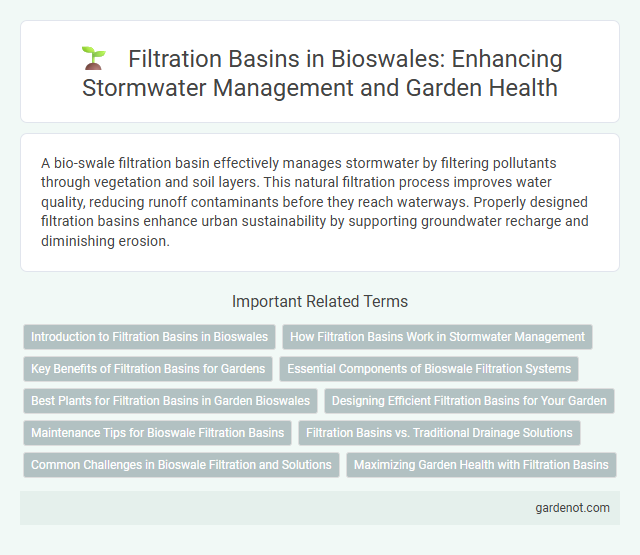A bio-swale filtration basin effectively manages stormwater by filtering pollutants through vegetation and soil layers. This natural filtration process improves water quality, reducing runoff contaminants before they reach waterways. Properly designed filtration basins enhance urban sustainability by supporting groundwater recharge and diminishing erosion.
Introduction to Filtration Basins in Bioswales
Filtration basins in bioswales serve as critical components designed to capture and treat stormwater runoff by promoting infiltration and pollutant removal through engineered soil media and vegetation. These basins effectively reduce contaminants such as sediments, heavy metals, and nutrients before water percolates into the groundwater or disperses into surrounding landscapes. Their strategic design enhances urban water management by mitigating flooding risks and improving water quality within green infrastructure systems.
How Filtration Basins Work in Stormwater Management
Filtration basins function by directing stormwater through engineered layers of soil, sand, and gravel that trap pollutants and sediments, improving water quality before infiltration or discharge. These basins enhance groundwater recharge by slowing runoff and promoting percolation through permeable media. Designed to handle variable flow rates, filtration basins effectively reduce contaminants such as heavy metals, nutrients, and hydrocarbons from urban stormwater systems.
Key Benefits of Filtration Basins for Gardens
Filtration basins enhance garden health by effectively capturing and filtering stormwater runoff, reducing pollutants such as sediments, nutrients, and heavy metals before they reach groundwater or waterways. These basins promote groundwater recharge and improve soil moisture levels, supporting plant growth and increasing biodiversity in garden ecosystems. Designed to integrate with natural landscapes, filtration basins also help prevent erosion and manage flood risks by controlling water flow and retention within garden areas.
Essential Components of Bioswale Filtration Systems
Bioswale filtration systems rely on essential components such as engineered soil media, which facilitates pollutant breakdown and water infiltration, and vegetation with deep root systems that enhance contaminant uptake and stabilize the soil. An underdrain system is critical for directing filtered water to stormwater drainage or groundwater recharge while preventing waterlogging. Incorporating these elements maximizes the bioswale's efficiency in removing sediments, nutrients, heavy metals, and hydrocarbons from stormwater runoff.
Best Plants for Filtration Basins in Garden Bioswales
Filtration basins in garden bioswales thrive with plants like Carex oshimensis, Juncus effusus, and Iris versicolor, which efficiently absorb and filter stormwater pollutants. These species feature dense root systems that enhance sediment trapping and nutrient uptake, improving water quality and reducing runoff. Native grasses and sedges also support habitat diversity while maintaining soil structure for optimal filtration performance.
Designing Efficient Filtration Basins for Your Garden
Efficient filtration basins integrate native plants and engineered soils to maximize stormwater absorption and pollutant removal, enhancing garden sustainability. Proper grading and layered media composition ensure optimal water flow and retention, reducing runoff and soil erosion. Incorporating organic matter and maintaining plant health further improve filtration performance and long-term basin functionality.
Maintenance Tips for Bioswale Filtration Basins
Regular inspection and removal of sediment, debris, and invasive vegetation in bioswale filtration basins enhance water flow and pollutant capture efficiency. Maintaining native plant health through seasonal pruning and replanting prevents clogging and supports microbial activity vital for contaminant breakdown. Routine monitoring of inlet and outlet structures ensures proper drainage, preventing water stagnation and promoting optimal filtration performance.
Filtration Basins vs. Traditional Drainage Solutions
Filtration basins provide enhanced stormwater management by naturally filtering pollutants through engineered soil media, unlike traditional drainage solutions that primarily focus on rapid water conveyance without treatment. These basins reduce runoff volume and improve water quality by promoting infiltration and microbial degradation of contaminants. Implementing filtration basins supports sustainable urban development and regulatory compliance by mitigating flooding and protecting local waterways.
Common Challenges in Bioswale Filtration and Solutions
Filtration basins in bioswales often face challenges such as sediment accumulation, clogging, and uneven water flow, which reduce filtration efficiency and increase maintenance needs. Using engineered soils with enhanced permeability, incorporating pretreatment measures like sediment traps, and designing graded slopes help manage sediment buildup and improve water distribution. Regular inspection and adaptive maintenance strategies ensure long-term functionality and optimal pollutant removal in bioswale filtration systems.
Maximizing Garden Health with Filtration Basins
Filtration basins enhance garden health by effectively capturing and filtering stormwater runoff, reducing pollutants and promoting clean water infiltration into the soil. These engineered depressions support nutrient retention and prevent soil erosion, fostering robust plant growth and improving overall garden resilience. Incorporating native vegetation within filtration basins boosts biodiversity and maintains natural water cycles, maximizing ecological benefits.
Filtration basin Infographic

 gardenot.com
gardenot.com